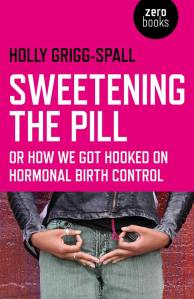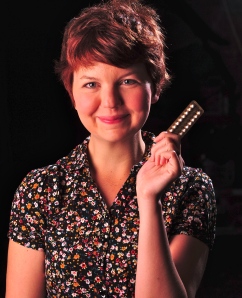Sweetening the Pill
January 31, 2014 13 Comments
 Holly Grigg-Spall’s book Sweetening the Pill does an amazing job uncovering the harmful effects, questionable history, and medicalized misogyny of hormonal birth control (HBC). She points out that both the pharmaceutical industry and modern third wave feminism have downplayed the harms of HBC and have equated use of the pill with liberation. As she says,
Holly Grigg-Spall’s book Sweetening the Pill does an amazing job uncovering the harmful effects, questionable history, and medicalized misogyny of hormonal birth control (HBC). She points out that both the pharmaceutical industry and modern third wave feminism have downplayed the harms of HBC and have equated use of the pill with liberation. As she says,
Contemporary feminism is enamored with consumer choice and has fully accepted it as a substitute for freedom. (p 61)
In discussion of this book I want to start by talking about my own experiences on the pill. Then I’ll mention the book’s critics, and finally I’ll cover a few of Grigg-Spall’s points.
My own experiences with HBC began in my teens when I began taking it for acne. I remember that once I started taking it, it took me about a month for my over-the-top emotional hormone swings to lessen. I recall going dancing in a club once and not being able to calm the intense pendulum of joy, anger, depression and more that kept swinging over me under the flashing lights. It was a feeling of being totally out of control.
Once my emotions leveled out, I was very good at taking the pill once per day at the same time every day. My friends and I used to sing what we called the tumbleweeds song about our uteruses. We’d imagine our wombs to be as empty as the ok corral prior to a gunfight, and sing ♪ oh e oh e oh, wah wah wah ♫ as our baby-free theme song. We thought it was funny. Our bodies were not at risk of fertility. They were under our control, and would not rebel against us.

I stayed on the pill for a decade at least.
I discovered radical feminism in 2011 and, like so many of us, it changed my life. My thinking was altered on many issues and continues to grow and expand the more I learn. About that same time I decided to go off the pill. The last straw came when doctors thought I had had a pulmonary embolism, which is a condition made more likely by HBC. A CT scan indicated that it was actually pneumonia, but that was a very scary experience for me. I decided to finish my pack and be done with the pill.
Over the next year as my body detoxed from the pill I developed acne all along my jaw/chinline that hadn’t been there before. Large bumps protruded on my face, which was embarrassing as I was well past adolescence. I also experienced weight gain, which I was told wasn’t a *real* side effect of going off the pill. It was frustrating not to believed when I reported my symptoms.
Before Grigg-Spall wrote her book she kept a blog regarding her experiences. Many other women came and shared what had happened to them while using the pill or getting off of it, and it was a place for women to be able to discuss their reactions to the pill in a place free from pharmaceutical brainwashing and the liberal feminist gag-order on women discussing our own biology.
Now that Grigg-Spall’s book was published in November 2013 there has been a concerted effort to discredit her findings by misrepresenting her positions. My belief is that the pharmaceutical industry is threatened by Griggs-Spall’s book and that discrediting her is a way to maintain the status quo. I also contend that rejecting the pill goes against sex-positive/mainstream feminism, which is why there’s push-back as well from its representatives.
Liberal feminists have called her book “dangerous” and use name-calling techniques in attempts to push Griggs-Spall to the margins of feminist discourse. As many of us know, being insulted and told to keep quiet are tools used to keep us away from discovering truths and maintain the status quo. Grigg-Spall is referred to as a “crank” (how feminist!), and potential readers of her book are warned that discussing female biology and women’s experiences is inherently “essentialist”. The cherry-picked, decontextualized quotes this critic uses to make her argument are an obvious attempt to contort perceptions of the book and Grigg-Spall’s positions. There are several critiques of this book that have similar tones and I found the pro-pill apologism quite transparent.
What these reviews leave out is the long-overdue feminist analysis of the pill that Grigg-Spall offers.
I was fascinated by Grigg-Spall’s discussion of the “dark side” of the pill. Apparently data collected from Bayer concentration camp experiments was used in developing the pill (p 31). The pill has negative side effects for women ranging from promoting bone loss (p 63) to blood clots to depression, etc. The World Health Organization (WHO) has classified the pill as a class one carcinogen alongside tobacco and asbestos (p 59). Apparently, Depo Provera is currently used in sex offender rehab programs to decrease sex drive (p 68).
These are just some of the negative aspects of HBC that third wave feminists and pharmaceutical companies routinely downplay.
Grigg-Spall also critiques the way HBC is set up as a solution to worldwide “population control” when the real issue is global inequality and poverty. The pill is a capitalist solution to this, and not a feminist one. We let women down when instead of seeking just societies we sell them injections or oral contraceptives. She quotes Betsy Hartmann who calls population control a “substitute” for social justice that holds back the emancipation of women.
Real reproductive choice relies on women having control over their own lives and equal power to men and this can only come with economic development. Developed nations are uninterested in providing aid for such countries, because they are active in their exploitation via cooperation with corrupt governmnents and via the corporate power wielded over those countries. The people are purposely kept poor so that developed countries (or at least their corporations) can become richer. (p 81-82)
This helps make sense of the fact that the Bill and Melinda Gates Foundation’s strategy for helping women in Africa and South Asia involves giving millions of these women the Depo Provera shot. The Gates Foundation partners with Pfizer, who makes the Depo shot (p 80). This is business as usual, and profits are being made in the name of “population control”.
Grigg-Spall also emphasizes the importance of female biology in discussing these issues. After all, as women “our experience of life is connected to our biology.” As she says,
Taking the pill might be seen as an act of trying to get beyond femaleness. As femaleness in our culture is understood in the negative, escaping its confines is good and progressive. Any dislike we develop of being female and of having a female body is rooted in the history of female bodies being seen as problematic and in need of male control (p 104).
Such claims have no doubt been the source of the liberal feminist claims that her book is “essentialist“. I find this accusation very suspect, as it asks us to stop speaking about our own experiences living within our female bodies. Many women are not comfortable with our bodies as they change in puberty, as they alter with pregnancy, or as they age. It is important that we are able to recognize and discuss these changes amongst ourselves without being considered “essentialist”.
Within feminism, essentialism has always referred to the feminist objection to conservative claims that the male gender stereotypes are natural for men, and that female gender stereotypes are natural for women. For example, the idea that men are better at math and women are natural caregivers. These are obviously anti-feminist claims that link our biology up with sexist behaviors that are expected of us.
These days, however, merely recognizing the relevance of female biology to our own lives is now castigated with the same “essentialist” label. This is an entirely inaccurate characterization, since the bodies we live in are obviously relevant to our experiences as women. Discussing biology was never the problem with essentialism. The problem was linking our bodies up with sexist stereotypes.
Not only is this new definition of essentialism an incorrect interpretation of the original meaning, but it asks women to stop discussing our actual lives. Feminism is about our experiences as women, so telling women they aren’t permitted to discuss these experiences is anti-feminism full stop.
I certainly believe that Grigg-Spall is correct in her observations about HBC. Women are expected to have sex “like a man” and to believe that our biology is in no way relevant to our sexuality. To me, this is as removed from our actual experiences as my cartoon uterus theme song is from the workings of my body.
I’ve covered just a few of the brilliant insights that Grigg-Spall presents in her excellent book. At the very minimum, her book encourages women to see the pill from a different perspective and to become more in tune with what is happening with our own bodies. I encourage all feminists interested in reproductive freedom, misogyny in medicine, or critiques of “choice”/”sex positive” feminism to give it a read.
